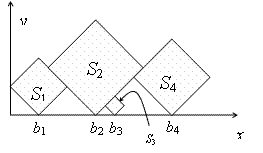题目链接:点击打开链接
| Time Limit: 2000MS | Memory Limit: 65536K | |
| Total Submissions: 2928 | Accepted: 1146 |
Description
In this problem, you are given a sequence S1, S2, ..., Sn of squares of different sizes. The sides of the squares are integer numbers. We locate the squares on the positive x-y quarter of the plane, such that their sides make 45 degrees with x and y axes, and one of their vertices are on y=0 line. Let bi be the x coordinates of the bottom vertex of Si. First, put S1 such that its left vertex lies on x=0. Then, put S1, (i > 1) at minimum bi such that
- bi > bi-1 and
- the interior of Si does not have intersection with the interior of S1...Si-1.

The goal is to find which squares are visible, either entirely or partially, when viewed from above. In the example above, the squares S1, S2, and S4 have this property. More formally, Si is visible from above if it contains a point p, such that no square other than Si intersect the vertical half-line drawn from p upwards.
Input
The input consists of multiple test cases. The first line of each test case is n (1 ≤ n ≤ 50), the number of squares. The second line contains n integers between 1 to 30, where the ith number is the length of the sides of Si. The input is terminated by a line containing a zero number.
Output
For each test case, output a single line containing the index of the visible squares in the input sequence, in ascending order, separated by blank characters.
Sample Input
4 3 5 1 4 3 2 1 2 0
Sample Output
1 2 4 1 3题意:依次给出n个正方形的边长,问从上往下看能看到哪几个正方形,从小到大输出。
思路:先用计算几何知识求出每个正方形的的左右端点坐标,然后枚举正方形,再判断其与前面的多边形的关系,如果有覆盖的情况产生,则更新。
代码:
#include <iostream>
#include <cstdio>
#include <cstring>
#include <algorithm>
using namespace std;
#define N 55
#define eps 1e-10
#define sqrt2 1.414214
struct point
{
double l,r,len;
} p[N];
double maxn(double a,double b)
{
if(a-b>eps) return a;
return b;
}
int main()
{
int n;
while(~scanf("%d",&n)&&n)
{
for(int i=0; i<n; i++)
{
scanf("%lf",&p[i].len);
p[i].l=0;
double l;
for(int j=0; j<i; j++)
{
if(p[j].len-p[i].len>eps)
l=p[j].l+(sqrt2/2)*(p[j].len+p[i].len);
else
l=p[j].l+(sqrt2/2)*(3*p[j].len-p[i].len);
p[i].l=maxn(p[i].l,l);
}
p[i].r=p[i].l+sqrt2*p[i].len;
}
for(int i=1; i<n; i++)
{
for(int j=0; j<i; j++)
{
if(p[i].len>p[j].len&&p[j].r-p[i].l>eps)
p[j].r=p[i].l;
if(p[i].len<p[j].len&&p[j].r-p[i].l>eps)
p[i].l=p[j].r;
}
}
for(int i=0; i<n; i++)
{
if(p[i].r>p[i].l)
printf("%d ",i+1);
}
printf("\n");
}
return 0;
}






















 712
712

 被折叠的 条评论
为什么被折叠?
被折叠的 条评论
为什么被折叠?








